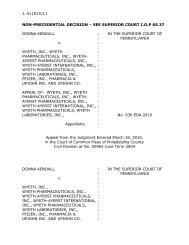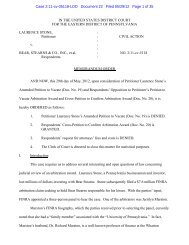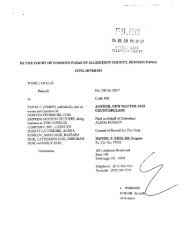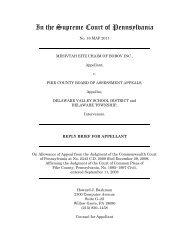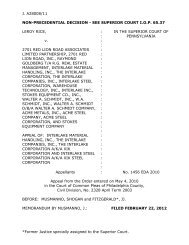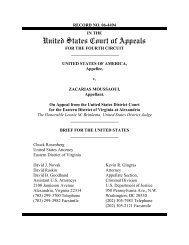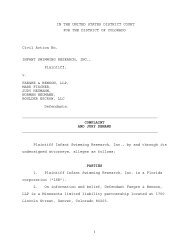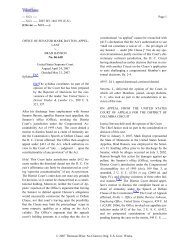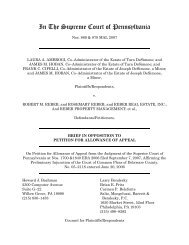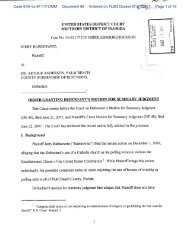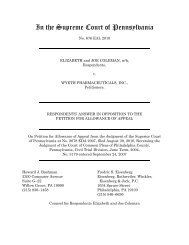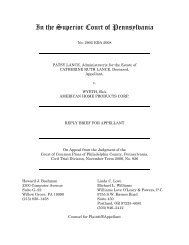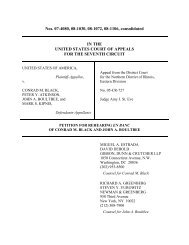DePinto v. Bayonne Board of Education
DePinto v. Bayonne Board of Education
DePinto v. Bayonne Board of Education
You also want an ePaper? Increase the reach of your titles
YUMPU automatically turns print PDFs into web optimized ePapers that Google loves.
Case 2:06-cv-05765-JAG-MCA Document 18 Filed 09/19/2007 Page 6 <strong>of</strong> 28<br />
Fraser’s First Amendment right to free speech and seeking injunctive and monetary relief under<br />
42 U.S.C. § 1983. Id. Citing “society’s interest in teaching students the boundaries <strong>of</strong> socially<br />
proper behavior,” the Court upheld the school’s authority to punish the student. Id. at 681.<br />
The Fraser Court reasoned that “it is a highly appropriate function <strong>of</strong> public school<br />
education to prohibit the use <strong>of</strong> vulgar and <strong>of</strong>fensive terms in public discourse.” Id. at 683. The<br />
Court focused on earlier Supreme Court cases, which addressed protecting minors from exposure<br />
to “sexually explicit” or “vulgar and <strong>of</strong>fensive” speech. See FCC v. Pacifica Foundation, 438<br />
U.S. 726 (1978) (holding that the Federal Communications Commission properly considered<br />
George Carlin’s “Filthy Words” monologue as “obscene, indecent or pr<strong>of</strong>ane” within the<br />
meaning <strong>of</strong> 18 U.S.C. § 1464, while considering the medium’s (radio) availability to minors); see<br />
Ginsberg v. New York, 390 U.S. 629 (1968) (upholding a New York statute which banned the<br />
sale <strong>of</strong> explicitly oriented materials to minors, despite the First Amendment protection <strong>of</strong> those<br />
materials for adults).<br />
The Fraser Court also distinguished its facts from Tinker because “[u]nlike the sanctions<br />
imposed on the students wearing armbands in Tinker, the penalties imposed in this case were<br />
unrelated to any political viewpoint.” Fraser, 478 U.S. at 685. The Third Circuit has interpreted<br />
Fraser as establishing that “there is no First Amendment protection for ‘lewd,’ ‘vulgar,’<br />
‘indecent,’ and ‘plainly <strong>of</strong>fensive’ speech in school.” Saxe, 240 F.3d at 213. 1<br />
1<br />
In its most recent opinion on this topic, the Supreme Court noted that it is unclear<br />
whether the Fraser Court distinguished itself from Tinker because <strong>of</strong> a) “the ‘marked distinction<br />
between the political message <strong>of</strong> the armbands in Tinker and the sexual content <strong>of</strong> [Fraser’s]<br />
speech,’” Morse, 127 S. Ct. 2626 (quoting Fraser, 478 U.S. at 680), or b) because “school boards<br />
have the authority to determine ‘what manner <strong>of</strong> speech in the classroom or in school assembly is<br />
inappropriate.’” Morse, 127 S. Ct. at 2626 (quoting Fraser, 478 U.S. at 683).<br />
Because the Morse Court did not need to “resolve this debate” within Fraser, the Court<br />
6



